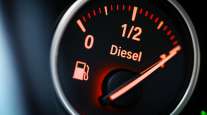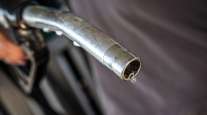Diesel Fuel, Gasoline Prices Spiral Higher
This story appears in the April 25 print edition of Transport Topics.
The surge in diesel prices continued last week, as the U.S. retail average rose 2.7 cents a gallon to $4.105, the Department of Energy reported.
Diesel has risen in 19 of the past 20 weeks, for a combined total of 94.3 cents, or 29.8%, from a base of $3.162 on Nov. 29. A year ago, the average stood at $3.074.
DOE’s Energy Information Administration also said April 18 that the regular gasoline average gained another 5.3 cents to $3.844. Gasoline has risen in 18 of the past 20 weeks, rising 34.6% during that time. It cost $2.86 a gallon a year ago.
Crude oil futures closed at $112.29 a barrel on April 21 on the New York Mercantile Exchange, just 50 cents below the year’s high close on April 8.
“It’s a huge issue for us, but I guess there are about a half dozen ways to attack it,” said Jim Henry, chief financial officer of Online Transport System, Greenfield, Ind. From a financial perspective, Henry said he has made sure he has availability under the company’s line of credit.
“After you pay for the fuel, it can be three to six weeks — sometimes even nine weeks — before your customers pay you. You have to be able to float those additional receivables,” he said.
Online operates 475 power units for truckload transportation. Henry said the company is accelerating its purchase of auxiliary power units, largely because of the current string of increases.
“You don’t necessarily do anything different than you have been doing, but it does make you pay more attention,” Henry said.
Werner Enterprises, which ranks No. 13 on the Transport Topics Top 100 list of the largest U.S. and Canadian for-hire carriers, made the same point about cash flow and fuel surcharges in its April 20 quarterly earnings statement — that is, a lengthy streak of rising prices slices into earnings. The theme was a recurring one in the early round of first-quarter reports.
The diesel, gas and crude prices are not far from their all-time records set in July 2008: $4.764 a gallon for diesel, $4.114 for gas and $145.29 a barrel for crude.
Refrigerated carriers, meanwhile, said they are trying to catch up on surcharges for reefer fuel, the red-dyed diesel that keeps loads cold.
Carriers also maintained their conservation efforts. Schneider National, the nation’s largest truckload carrier, said it soon will start its annual engineering test program — a practice it started in 1989 — to reduce fuel consumption.
The Green Bay, Wis., carrier said it runs Type II and III Society of Automotive Engineering tests annually to help evaluate technology. Vice President Steve Graham said that, starting in June, the company will look at low-viscosity motor oils, renewable fuel alternatives, low-rolling-resistance tires, new engine calibrations, predictive cruise control and verification of wind tunnel testing on tractors.
On the NYMEX crude oil market, futures contracts closed below $110 a barrel for seven trading days until the Energy Department reported on April 20 that petroleum stockpiles were decreasing and refineries were getting busier.
For instance, ultra-low-sulfur distillate stocks — the basis of diesel fuel — dipped to 104.8 million barrels on April 15 from 106.2 million the week before. A year ago, though, they were at 90.3 million barrels.
The demand for distillate rose to 4.11 million barrels a day during the week ended April 15, up from 3.8 million barrels the week before.
Retail diesel prices are above $4 a gallon throughout the nation. The Gulf Coast states have the least expensive fuel, but even the average there is at $4.033. California, which uses a special formulation of diesel, has the highest average price at $4.44.
High fuel prices have sparked unrest even in China. The Associated Press reported on April 21 that hundreds of truck drivers demonstrated in Shanghai against high fuel prices, fees and general inflation.




